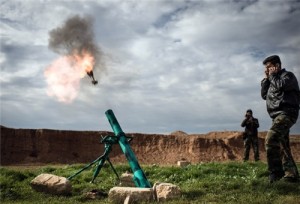 Washington�s posture toward Iran and Iran�s support to the Syrian regime has been conflicted. On the one hand, the U.S. has not been hesitant to aggrandize Iran�s role and make it sound as though the Assad government has survived only because of Iran�s military support. On the other hand, the U.S. seemingly rules out Iran�s involvement in any serious conversation among the regional and extra-regional parties fueling the Syrian civil war.
Washington�s posture toward Iran and Iran�s support to the Syrian regime has been conflicted. On the one hand, the U.S. has not been hesitant to aggrandize Iran�s role and make it sound as though the Assad government has survived only because of Iran�s military support. On the other hand, the U.S. seemingly rules out Iran�s involvement in any serious conversation among the regional and extra-regional parties fueling the Syrian civil war.The reason for this conflicted posture is clear. The United States, along with Iran�s regional rivals, has seen in the Syrian tragedy an opportunity to weaken Iran. Iran�s military security elites, in turn, have reacted by portraying the removal of the Syrian regime as an immediate threat to Iran�s national interests and security.
In Syria, the U.S. sees an opportunity to weaken Iran. It would be more productive to see it for what it is: a nation in need of global cooperation.
Syria, however, is well beyond a proxy war. It is out of control, spawning a humanitarian tragedy and an ideology that is not only virulently anti-Iranian and anti-Shiite but also anti-American. Syria�s turmoil today is similar to the instabilities that gave rise to the Taliban in Afghanistan. And it is precisely for this reason that Iran and the United States may again find themselves in the same corner.
Given the new moderate leadership in Iran, which has �easing tensions� as its foreign foreign policy mantra, some sort of U.S.-Iran engagement is not only possible � as it was in the ouster of the Taliban in 2001, when the reformist Mohammad Khatami was Iran�s president � it may even be necessary. This is particularly so if the imminent U.S. attack degrades the Syrian regime�s capabilities and enhances the power of an opposition that the United States or its allies in the region do not necessarily control.
Washington may choose to ignore this necessity and continue to see Syria as an arena for weakening Iran instead of a place in dire need of coordinated regional and global efforts. But this would be the result of a misguided policy and not an inevitable result of the attack on Syria.
By The New York Times
The Iran Project is not responsible for the content of quoted articles.










